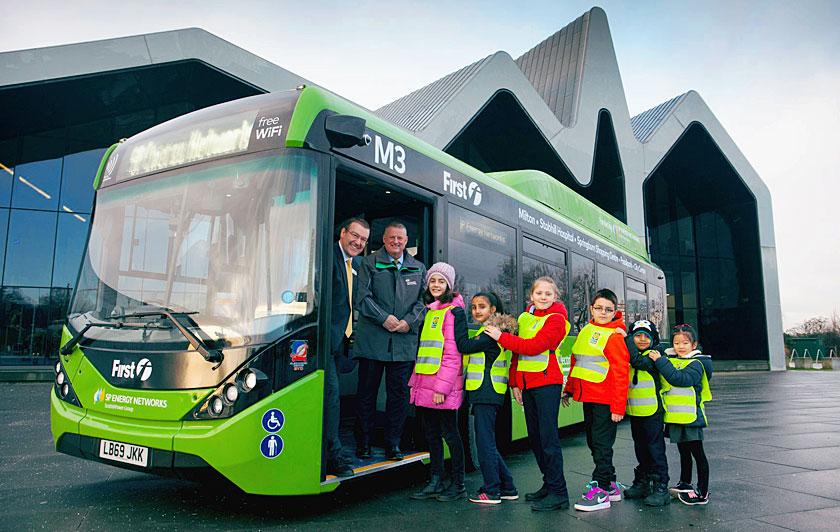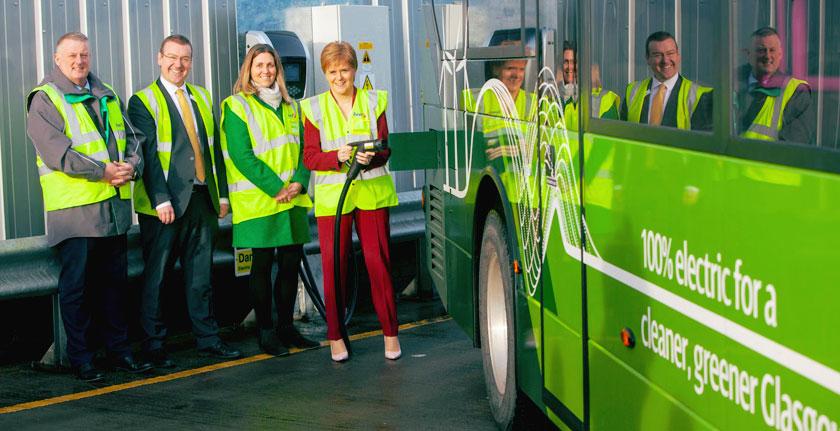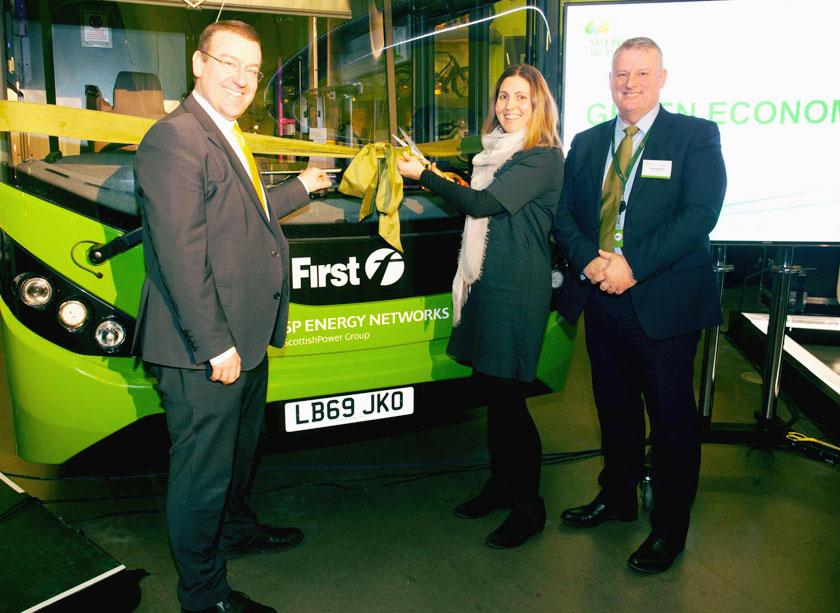Today, we are proud to be unveiling two all-electric buses which we have fully funded to help First Glasgow become the city’s first commercial bus operator to introduce state-of-the-art fully-electric vehicles onto a commercial bus route since the 1960s.

The new buses are a statement of intent for the city’s transport, as they look to join the electric revolution to help meet their bold target of net zero emissions by 2030. The launch of these vehicles means the city has now come full circle back to fully electric transport on commercial routes for the first time since the electric trolley buses were decommissioned by the Glasgow Corporation in May 1967.
The new vehicles will be going on the M3 route, which connects communities in Milton and Springburn with Stobhill Hospital and the city centre.
The electric buses are being fully funded as part of our £20million Green Economy Fund, which supports Glasgow’s mission to become the UK’s first net zero emissions city by 2030. It also contributes to the Scottish Government’s ambitious plans to meet climate change targets, boost local economic growth, improve air quality across the country and deliver a better future, quicker for our communities.

The new single decker buses were revealed this morning on Glasgow’s George Square before going on a tour of the city. 14 lucky pupils from St Joseph’s Primary School were among the first to hop on board when it stopped at the school gates and they were welcomed on board by Councillor Anna Richardson, City Convener for Sustainability and Carbon Reduction at Glasgow City Council, who has led the charge for country’s first Low Emission Zone in Glasgow.
One of the buses will now go on display at the Riverside Museum until close of play on Sunday the 12th of January, so people across Glasgow can get a first look for themselves, before going into service on the M3 route from Monday, 13th of January.
The new M3 electric buses, built by Alexander Dennis at their Falkirk factory, have the latest mirrorless smartvision technology, which removes the need for wing mirrors, helps reduce blind spots for drivers and even helps to reduce the effects of bad weather on their vision via the state-of-the-art CCTV system. The new vehicles will also have USB charging points, on-board audio-visual next stop announcements and free Wi-Fi to provide a better customer experience.
As part of our funding deal, First Glasgow will also introduce 22 electric vehicle charging points in its Glasgow Caledonia Depot, which will ultimately allow more electric buses to be introduced by First Glasgow into Glasgow’s transport network in the future.
First Glasgow has already invested over £31million over the last two years with the introduction of 150 brand new euro VI ultra-low emission vehicles for Greater Glasgow, whilst retrofitting another 49 mid-life vehicles to speed up the switch to low emission standards in support of Scotland’s first low emission zone in Glasgow city centre.
The bus operator is already 40% compliant and will introduce even more new low emission buses to the city to ensure it is 100% compliant with the city’s low emission zone to at least Euro VI emissions standard by the end of 2022.
First Minister, Nicola Sturgeon MSP, attended First Glasgow’s Caledonia Depot to plug the new electric buses in for their first charge and is delighted with the new addition to the city’s bus fleet.

First Minister, Nicola Sturgeon MSP, said: “It is a real pleasure to see First launch their fully electric buses in Glasgow, following funding from SP Energy Networks. Scotland was one of the first countries to acknowledge that we are facing a global climate emergency and we have legislated for the most ambitious carbon reduction target of any country in the world.
“A key part of our plans is encouraging greater use of public transport as well as phasing out petrol and diesel vehicles. It’s so great to see First and SP Energy Networks playing their part in helping us to achieve our goal of net-zero carbon emissions by 2045.”
Frank Mitchell, CEO at SP Energy Networks, said: “Glasgow has ambitious plans to be the UK’s first net zero carbon city by 2030 but for that to happen there will be big changes across the city. The introduction of the low emission zone was the city’s first big test and sets out a marker for its ambitions. The introduction of this new electric bus technology which will ultimately improve air quality and noise pollution in the city centre and other communities. We are very proud to be supporting this historic moment for Glasgow by fully funding the infrastructure and vehicles for its first completely electric bus route since the 1960s.”

Andrew Jarvis, Managing Director for First Glasgow, said: “We are delighted to launch the city’s first conversion of a commercial bus service to fully electric operation. The whole team at First Glasgow are thrilled to be teamed up with SP Energy Networks in order to bring these state-of-the-art zero emission vehicles to the people of Glasgow and the M3 route.
“The M3 connects communities in Milton and Springburn with Stobhill Hospital and the city centre and it was a natural route for us to introduce these buses which are fitted with 330kwh batteries as well as USB chargers for customer use, free Wi-Fi and onboard audio-visual next stop announcements to make bus travel even easier and more convenient for customers as well as better for the environment.
“Every customer journey on the route will save around 2kg of CO2 compared with driving on your own in an average car, making bus the best choice in reducing the impact on the planet.
“As a business, one of our main goals is to make buses part of the solution when it comes to improving air quality in the city. We’ve already invested £31million in the last two years. By working with Glasgow City Council and Transport Scotland, we plan to make great strides forward in doing our bit to improve the city’s air quality and making Glasgow a cleaner and greener place to live and work.”
Cllr Anna Richardson, City Convener for Sustainability and Carbon Reduction said: “I’m delighted that Glasgow will soon see these fully electric buses on commercial routes within our city, further incentivising bus travel as a convenient and sustainable alternative to the car. It’s a testament to First’s commitment to improving air quality, and follows on from their recent investment in brand new low emission buses as well retrofitting a significant number of their existing fleet to LEZ emission standard.”
So far, 33 projects have been awarded funding by us across Central and Southern Scotland. Find out more about the Green Economy Fund and the projects it supports.
For further information or to arrange an interview, please contact Shaun Bell or Hayley Gibson on 0131 561 8628 or greeneconomy@stripecommunications.com.
Notes to Editors
SP Energy Networks:
- SP Energy Networks (SPEN) is the distribution arm of ScottishPower and the licensed Electricity Distributor (DNO) for Central & Southern Scotland and for Merseyside, Cheshire, North Wales and North Shropshire.
- SPEN also operates the Transmission Network in Central and Southern Scotland. They take electricity generated from power stations, windfarms and various other utilities and transport it through their vast transmission network, consisting of over 4000 kilometres of overhead and 320 kilometres of underground lines. They have 129 transmission substations in their network that help us to manage extra high voltage electricity supplies.
- From 2015 to 2023 SP Energy Networks plans to invest approximately £7 billion into the electricity network. To keep power supplies on the company currently manages over 110,000km of power cables (over once around the globe) and 30,000 substations (one for every 100 customers), across their network area.
Green Economy Fund:
- The Green Economy Fund is a way of SP Energy Networks investing in the communities that it serves to support the Scottish and the UK Government’s energy ambitions.
- SP Energy Networks have committed to voluntarily contribute up to £20million over a two-year period to support initiatives that will benefit the people of Scotland and support Scotland’s ambitious green energy plans and local economic growth.
- The fund aims to: build the infrastructure and the learnings needed for the changes in heating and transport expected over the next decade; stimulate economic activity and create jobs in Scotland; support the Scottish Government’s ambitious energy strategy and the UK’s drive to a low carbon economy; work with specific communities within our operational area in Scotland, supporting both rural and urban areas in particular that suffer from fuel poverty; and provide access to funding for projects that may ordinarily struggle to obtain funding.
First Glasgow
First Glasgow is the largest bus operator in the city running services on more than 80 different routes. The company operates more than 800 buses and employs around 2,100 staff. For more information please visit First Group Glasgow.